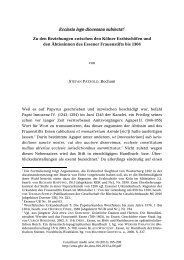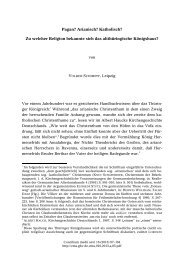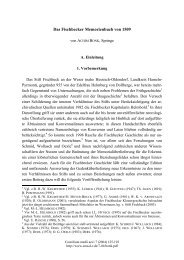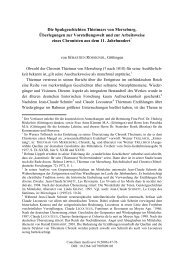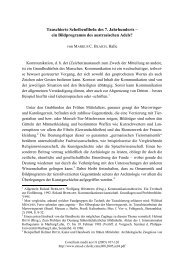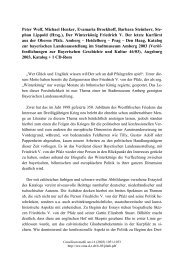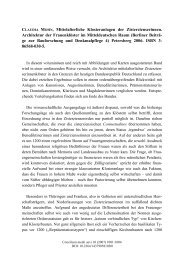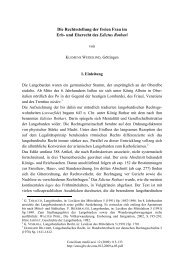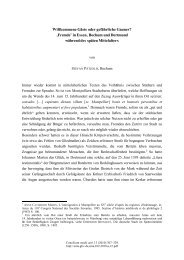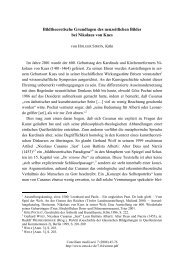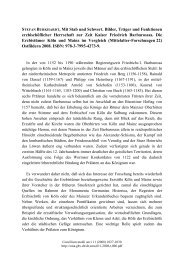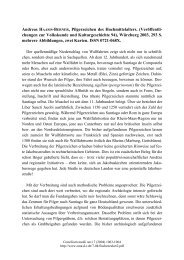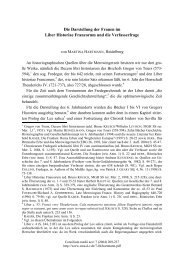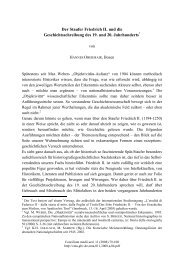Rabanus Maurus - Concilium medii aevi
Rabanus Maurus - Concilium medii aevi
Rabanus Maurus - Concilium medii aevi
Create successful ePaper yourself
Turn your PDF publications into a flip-book with our unique Google optimized e-Paper software.
FEE-ALEXANDRA HAASE: Rhetoric as praise of the emperor<br />
ancient canon of education rhetoric took part as one of the elements of the trivium.<br />
Like later ‘Praeceptores Germaniae’ (Melanchthon, Heyne) the work of Rhabanus<br />
contains rhetorical writings in order to develop the educational program and the<br />
political intentions.<br />
William of Ockham’s Dialogus contains passages mentioning the authority of<br />
Rhabanus <strong>Maurus</strong> (pars 3, tr. 1, lib. 3, cap. 8-11):<br />
Magister<br />
Ad illam quae in promissione Christi Matthaei ultimo est fundata respondetur quod<br />
Christus futurus est cum ecclesia universali usque ad consummationem seculi, et ideo<br />
(ut dicit <strong>Rabanus</strong>, sicut allegatum est) "usque in finem seculi non sunt defuturi in<br />
mundo qui divina mansione et inhabitatione sunt digni"; ex quibus verbis Rabani<br />
colligitur quod dicta promissio Christi non debet intelligi de concilio generali, tum<br />
quia dicit "non sunt defuturi in mundo" et non dicit non sunt defuturi in concilio<br />
generali, tum quia raro concilium generale est in mundo, universalis autem ecclesia<br />
semper usque ad consummationem seculi erit in mundo. Ergo secundum Rabanum illa<br />
promissio Christi non de concilio generali sed de universali ecclesia debet intellegi, ut<br />
pie et absque dubio sit tenendum semper Spiritum Sanctum adesse universali<br />
ecclesiae. Sic etiam Hieronymus de universali ecclesia intellegit cum dicit Christum<br />
nunquam a credentibus recessurum, quia semper erunt usque ad consummationem<br />
seculi aliqui Christo credentes, sive concilium generale sit sive non sit. 46<br />
The tradition of rhetoric after ancient time brings changes into the use of the literary<br />
genre of the didactical dialogue. In general, authenticity is no longer a value and<br />
instead of this the literary genre is more concerned with the documentation of ancient<br />
knowledge. Alcuin’s work shows how the speakers become exempli for good speaking<br />
and so also object of the genus laudativum. The ideal dialogue has the function of a<br />
political image propagating the wise emperor, which is of course an ancient<br />
philosophical topos. Plato’s work is a paradigm for the dialogue as a form of didactical<br />
writing and Plato can claim to have founded this literary genre. The characters of<br />
Alcuin and Charlemagne are chosen exempli for the transmission of ancient<br />
knowledge. While the Platonic dialogues were also constructed in regard of the<br />
background and their disposition is chosen depending on the theme of each dialogue in<br />
terms of the speakers and the circumstances of the meeting, the dialogue between<br />
46 http://www.humanities.mq.edu.au/Ockham/w31d3btx. html. [7.7.2004]<br />
William of Ockham, Dialogus, pars 3, tr. 1, lib. 3, cap. 8-11.<br />
23



